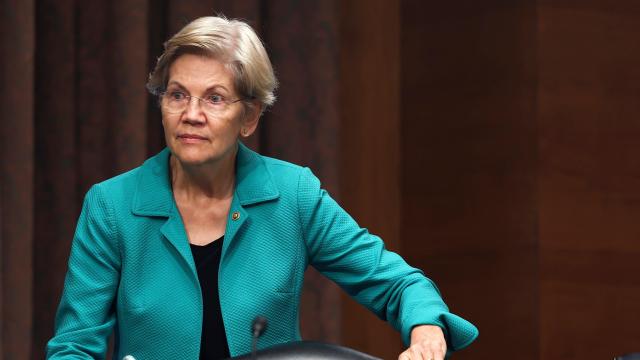There’s a new bill coming to Congress to deal with crypto, and this one’s not pulling many punches on the entire crypto ecosystem.
On Wednesday, Democratic Sen. Elizabeth Warren and Republican Sen. Roger Marshall announced they were introducing legislation that would extend current money laundering laws to cryptocurrencies. This “Digital Asset Anti-Money Laundering Act” would essentially extend the existing Bank Secrecy Act to the groups that provide crypto wallets and crypto miners, essentially turning them all into more traditional money service businesses.
Congress passed the BSA in 1970 to force financial institutions to help the federal government prevent money laundering. This proposed law would give the Treasury Department’s Financial Crimes Enforcement Network, otherwise known as FinCen, wide powers to regulate crypto by, essentially, making them as beholden to certain regulations as big banks.
“The crypto industry should follow common-sense rules like banks, brokers, and Western Union, and this legislation would ensure the same standards apply across similar financial transactions,” Warren said in her release. “The bipartisan bill will help close crypto money laundering loopholes and strengthen enforcement to better safeguard U.S. national security.”
Warren and Marshall’s bill would cement proposed Know Your Customer rules onto the crypto industry. Two years ago, the Treasury Department proposed new rules that would force entities to record and report any potential malicious activities of users with “unhosted wallets,” AKA wallets not tied to any crypto exchange or third party. The agency said that move would “increas[e] transparency in digital currencies and clos[e] loopholes that malign actors may exploit.”
Though current regulation often falls on the Securities and Exchange Commission and Commodity Futures Trading Commission, the bill would also direct both agencies to report compliance with these KYC requirements to FinCen.
The bill would also put a complete quash on so-called “crypto mixers,” which are programs that take multiple users’ crypto, mix it all into one big pot before redistributing the same amount to each user, minus a small fee. Earlier this year, the Treasury Department sanctioned the mixer Tornado Cash, alleging it had been used by North-Korean affiliated hackers to launder billions of dollars in crypto stolen from the NFT-based game Axie Infinity.
Such a move would be a major turning point for the crypto industry, which has so far proclaimed its status as an anonymised and decentralized way of making payments, never mind how so few crypto transactions are for (legal) goods or services. Still, after the utter implosion of the crypto exchange FTX and now the arrest of once-lauded crypto wunderkind Sam Bankman-Fried, Congress as a whole is flabbergasted with how to actually regulate crypto.
Crypto proponents have already decried the proposed bill. Washington D.C.-based pro-crypto think tank Coin Centre wrote it was an attack on the “personal freedom and privacy of cryptocurrency users” by making all crypto entities act like a regular financial institution.
Warren and Marshall’s bill will likely struggle to find traction in Congress. During Tuesday’s House Financial Services Committee hearing on FTX, multiple noted crypto proponents and members of the so-called “Blockchain 8” tried to protect “innovation” and put the blame on the SEC for essentially forcing crypto companies offshore, where there was less chance of U.S. regulation. A few of the two Democrats’ fellow senators are still pushing for regulations to come from the Commodity Futures Trading Commission.
“What I want to protect is innovation, and we want to see it flourish…”
Blames SEC for regulation by enforcement, says they’ve forced crypto companies offshore. Talks up his own attempts to regulate crypto. 2/2#FTXhearing
— Molly White (@molly0xFFF) December 13, 2022
Warren has come out as a major opponent of the crypto industry, having previously taken crypto miners to task over the mass amount of power these operations were using in Texas. Last week, she wrote a letter to Federal Reserve Chair Jerome Powell concerned about the lingering ties between the banking and crypto industries after the fall of FTX.
Editor’s Note: Release dates within this article are based in the U.S., but will be updated with local Australian dates as soon as we know more.
